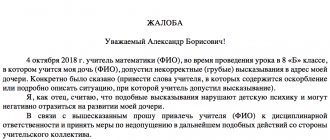Commentary to Art. 157 Criminal Code
1. The objective side of the crime provided for in Part 1 of Art. 157 of the Criminal Code, is characterized by a parent’s failure to pay, without good reason, in violation of a court decision or a notarized agreement, funds for the maintenance of minor children, as well as disabled children who have reached the age of 18.
2. Failure to pay child support should be understood as a direct refusal to pay alimony, failure to inform the bailiff or the person receiving alimony about dismissal, failure to inform about a new place of work, concealment of one’s earnings, and when paying alimony to minor children, the availability of additional income. or other income (Article 111 of the RF IC). If the failure to pay alimony occurred due to the illness of this person or for other valid reasons and his financial and family situation does not make it possible to pay off the resulting alimony debt, then the person is not subject to criminal liability.
3. Special subject: father and mother, recorded by the child’s parents in the birth register; persons whose paternity is established in the manner provided for in Art. 49 RF IC; parents deprived of parental rights.
4. The objective side of the crime provided for in Part 2 is characterized by the failure of adult able-bodied children to pay funds for the maintenance of disabled parents without good reason, in violation of a court decision or a notarized agreement.
5. Special subject: able-bodied adult children of a person for whose maintenance alimony has been collected by a court decision. Children are exempt from paying alimony to parents deprived of parental rights (Article 87 of the RF IC).
6. Both crimes are considered completed from the moment of non-payment of funds, if this occurred after the resolution imposing an administrative penalty for committing a similar act entered into legal force (Article 5.35.1 of the Code of Administrative Offenses of the Russian Federation) and before the expiration of one year from the date of completion of the execution of this resolution.
Municipal entity Alagirsky district
Criminal liability under Part 1 of Art. 157 of the Criminal Code of the Russian Federation (Criminal Code of the Russian Federation) is punishable for failure by a parent to pay without good reason, in violation of a court decision or a notarized agreement, funds for the maintenance of minor children, as well as disabled children who have reached the age of eighteen, if this act is committed repeatedly by a person subject to administrative punishment.
Most often in judicial practice the question arises of determining malice in the case of partial payment of funds. In this regard, when considering issues of criminal liability under Art. 157 of the Criminal Code of the Russian Federation, in the presence of partial payments for alimony, investigative bodies and courts are also guided by the position of the Constitutional Court of the Russian Federation, expressed in resolutions of July 30, 2001 No. 13-P, dated January 15, 2002 No. 1-P, dated July 14, 2005 No. 8-P, according to which the protection of violated rights cannot be recognized as valid if a judicial act or an act of another authorized body is not executed in a timely manner and in full.
Thus, partial alimony payments do not exclude the criminality of the act, but their size is subject to determination during the investigation of a criminal case in order to determine the actual amount of alimony debt.
This position is also reflected in the Resolution of the Plenum of the Supreme Court of the Russian Federation dated April 27, 2021 No. 6 “On some issues arising in judicial practice when considering cases of administrative offenses related to non-payment of funds for the maintenance of children or disabled parents,” according to which subjective side of the administrative offense provided for in Parts 1, 2 of Art. 5.35 1 of the Code of the Russian Federation on Administrative Offenses (CAO RF), is characterized by an intentional form of guilt, as well as the crime provided for in Art. 157 of the Criminal Code of the Russian Federation. A person obligated to pay alimony is subject to administrative liability even if it is established that he deliberately underpaid funds for the maintenance of children or disabled parents, that is, paid alimony in an amount less than that provided for by a judicial act or an agreement on the payment of alimony, since this circumstance is a violation of them.
From this explanation it follows that when making a decision to bring the debtor to administrative liability under Art. 5.35 1 Code of Administrative Offenses of the Russian Federation and criminal liability under Part 1 of Art. 157 of the Criminal Code of the Russian Federation, if there are alimony payments in an amount less than that provided for by a judicial act or an agreement on the payment of alimony, it is necessary to assess the subjective side of the act committed, that is, to establish the reasons why the debtor made alimony payments in an amount less than the established one, including including assessing the financial situation of the debtor, the socio-economic situation in the area where the debtor lives and works, and the level of unemployment.
Regarding the determination of the period of non-payment of alimony, entailing administrative liability under Art. 5.35 1 of the Code of Administrative Offenses of the Russian Federation, the Supreme Court of the Russian Federation clarified that the period of non-payment of alimony must be at least two months in a row within the framework of the initiated enforcement proceedings. The specified two-month period begins the next day after the expiration of the deadline for payment of a one-time or monthly payment established by a judicial act or agreement on the payment of alimony. The administrative offense will be terminated in connection with the discovery of the fact of non-payment of alimony for two months in a row or in connection with the voluntary termination by a person of non-payment of alimony after the specified two-month period.
In this case, the victim in this category of cases is the person for whose maintenance alimony is to be paid in accordance with a judicial act or an agreement on the payment of alimony, and the protection of the rights and legitimate interests of the victim who is a minor or, due to his physical or mental condition, is deprived of the opportunity to independently realize his rights , in the proceedings regarding an administrative offense is carried out by a legal representative. A similar principle applies when deciding the issue of determining the victim in criminal prosecution.
The Criminal Code of the Russian Federation provides for punishment for non-payment of funds for the maintenance of children in the form of correctional or forced labor, arrest or imprisonment for up to one year.
Second commentary to Art. 157 of the Criminal Code of the Russian Federation
1. The commented article provides for liability for two independent crimes: in Part 1 - for a parent’s failure to pay, without good reason, in violation of a court decision or a notarized agreement, funds for the maintenance of minor children, as well as disabled children who have reached the age of 18; in Part 2 - for failure by adult able-bodied children to pay funds for the maintenance of disabled parents without good reason, in violation of a court decision or a notarized agreement. The concept of non-payment in relation to both cases is given in the note to Art. 157 of the Criminal Code.
2. Administrative prejudice is a crime-forming feature.
3. The subjective side of both crimes is characterized by direct intent.
4. The subject of a crime under Part 1 of Art. 157 of the Criminal Code are parents, i.e. persons recorded by the father or mother of the child in the birth register, including those whose paternity has been established in the manner prescribed by Article 49 of the RF IC; subject of the crime provided for in Part 2 of Art. 157 of the Criminal Code - adult able-bodied children of a person for whose maintenance alimony has been collected by a court decision or a notarized agreement.
Article 157 of the Criminal Code of the Russian Federation (“Non-payment of funds for the maintenance of children or disabled parents”)
The Criminal Code of the Russian Federation states that parents who regularly do not provide financial support for their children under the age of majority and disabled adults, but are obliged to do this on the basis of a court decision or an agreement certified by a notary between parents, bear criminal liability for this.
Types of liability include the following:
- forced or forced labor;
- arrest;
- deprivation of liberty.
Each type of punishment can be imposed for up to a year, with the exception of arrest. Its maximum duration, in contrast to serving a sentence in prison, is three months.
If adult children who are able-bodied regularly do not provide financial support for their disabled or incapacitated parents, but are required to do so on the basis of a court decision or a notarized agreement between the parties, they are also criminally liable for this.
The limits and types of criminal liability for these acts are the same as in the case of providing for children.
The Criminal Code contains a note to this article, which explains the concepts of “non-payment of alimony by parents” and “non-payment of alimony by children”.
Failure to pay money awarded by a court decision that has entered into force or established by a notarial agreement between parents for the maintenance of minor children (or adults but disabled), if this act is repeated and there are no valid grounds for evading payment of the required amounts, provides for criminal prosecution liability for non-payment of alimony under Article 157 of the Code, if the debtor at the time of consideration of the case before the judge pronounces a sentence is a defendant in an administrative case under the Code of Administrative Offenses of the Russian Federation (Article 5.35.1).
A similar interpretation is provided if the subject (criminal) is an able-bodied child in relation to a disabled parent.
Procedure for the claimant in case of malicious evasion of the payer
If there are signs of malicious non-payment, the claimant needs to:
- Apply for prosecution to the head of the FSSP department.
- The bailiff will check the grounds and hand over the documents to a senior department head for signature.
- After a series of events, the documents are transferred to the prosecutor's office and the court.
- Court hearings are held, a verdict is passed and announced in court.
- The sentence is executed after it enters into force after 10 days (Article 389.4 of the Code of Criminal Procedure of the Russian Federation).
Even if the debtor is deprived of his freedom, this does not cancel alimony obligations. Most of the convicts work and receive a salary, and payments will be calculated from it.
How to prosecute a parent for non-payment of child support?
So, the claimant has in his hands a judge’s writ of execution to recover funds for the child (or disabled parent) or a properly drawn up agreement. An unscrupulous parent is in no hurry to make payments, and there are no valid reasons for delaying payments.
In this case, you should file an application with the bailiff at the place of residence of the alimony holder.
Sample application to bring a person to criminal liability under Part 1 of Art. 157 of the Criminal Code of the Russian Federation
Before starting production, the contractor will check:
- will send inquiries to the defaulter’s place of work, if the latter is fired - to the employment center;
- requests information about the financial status of a person;
- will call the defaulter for a conversation;
- will seize the property of the alimony provider.
You will learn how to collect funds under a writ of execution by reading our article.
Bailiff's procedure
- If it is established that the debtor does not pay alimony without good reason, the executor, within 2 months from the date of initiation of enforcement proceedings, draws up an administrative protocol under Art. 5.351 Code of Administrative Offenses of the Russian Federation. The protocol with the materials is sent to the court.
- If the alimony provider does not pay alimony within 2 months after the imposition of administrative sanctions, the bailiff draws up a report on the presence of signs of Art. 157 of the Criminal Code of the Russian Federation. The report is accompanied by copies of the enforcement proceedings, court decisions on the administrative protocol, explanations of persons and other materials.
- If there are signs of a crime, the executor issues a resolution to initiate a criminal case for non-payment of alimony and conducts a pre-trial investigation. After its completion, the criminal case is sent to court.
The algorithm for the bailiff’s activities is prescribed in the Letter of the FSSP dated 07/05/16 No. 00043\16\60663-СВС “On the procedure for applying the provisions of federal laws.”
Liability for malicious evasion of alimony payments
If the payer does not fulfill his obligations, he may be subject to various types of liability
- Civil.
- Administrative.
- Criminal.
Civil responsibility
Civil liability can be brought at any time. It means:
- Payment of alimony penalties. The collection process is carried out in court, the plaintiff is the interested person - the recipient of alimony. According to the general rules of family law, the penalty is 0.1% for each day of delay in mandatory payments. In case of non-payment for more than six months, the amount of the penalty exceeds the amount of the principal debt (Article 115 of the RF IC).
- Deprivation (limitation) of parental rights. The only form of punishment that takes into account the severity of the offense (Articles 69, 73 of the RF IC).
Administrative responsibility
Administrative responsibility is divided into two forms, applied depending on the circumstances.
| Compulsory measures used in the process of enforcement proceedings (Chapter 7 of Federal Law No. 229) | Administrative sanctions provided for in Art. 5.35.1 Code of Administrative Offenses of the Russian Federation |
|
|
When measures are taken against the debtor at the initiative of the FSSP or the collector, and do not produce results, the bailiff brings the alimony-obligee to administrative responsibility.
Criminal liability
The punishment provided for in Art. 157 of the Criminal Code of the Russian Federation, applied after prosecution under the Code of Administrative Offenses of the Russian Federation.
A mandatory condition is to notify the persistent defaulter of the consequences of non-payment of alimony at least twice. Criminal prosecution occurs in the course of execution. production.
The types of punishment are established by Article 157 of the Criminal Code of the Russian Federation and provide for:
- correctional or forced labor (up to 1 year);
- arrest (up to 3 months);
- imprisonment (up to 1 year).
Deprivation of parental rights
Article 69 of the RF IC determines the possibility of depriving parental rights if the payer does not pay child support.
To implement this type of responsibility there must be grounds:
- malicious evasion (deliberate actions);
- reluctance to participate in the child's life.
To deprive parental rights, you must go to court with a statement of claim and other documents:
- an official document confirming marital status (fact of registration/divorce of marriage);
- birth certificate of a minor;
- evidence that the alimony obligee does not take part in the upbringing and development of the child;
- certificate of alimony debt issued by the Federal Bailiff Service.
Deprivation/limitation of parental rights does not exempt from child support obligations.
Ways to mitigate punishment
If the debtor wants to avoid liability, this is possible in several cases:
- The debt has been repaid partially or in full.
- File a claim for a change (release) in the amount of alimony obligations (this method presupposes the presence of a valid reason at the time the debt was formed).
- Receiving disability.
- Appearance of other dependents.
- Deprivation of a place of employment due to circumstances beyond the control of alimony obligations: dismissal due to layoffs or liquidation of an enterprise.
It is better to pay off the debt immediately, even if a criminal case has already been initiated. In this case, production may be stopped.
How to avoid paying alimony legally?
Exemption from alimony payments and preparation of a statement of claim
What punishment does the debtor face?
Sanction Art. 157 of the Criminal Code of the Russian Federation provides for the following types of punishments:
- repairs for up to 1 year;
- forced labor – up to 1 year;
- arrest – up to 3 months;
- imprisonment – up to 1 year.
The type of punishment is determined taking into account the circumstances of the case. The judge takes into account the reasons for non-payment, the level of income of the debtor, characterizing data and even behavior in court.
A court verdict and serving a sentence do not relieve the alimony holder from paying alimony. If the judge determines the punishment in the form of correctional work, I will make deductions from the debtor’s earnings in favor of the alimony recipient.
You will learn even more about how to bring a debtor to criminal liability for non-payment of alimony by reading our article.
Facebook
When can a parent be held criminally liable for failure to pay child support?
According to the sanction of the article, criminal liability will occur if three points are present:
- the obligation to pay alimony must be confirmed by a court decision or a notarized agreement;
If the debtor does not comply with the court decision to collect alimony or the agreement, the executor initiates proceedings, notifies the alimony provider of the need for payments and of criminal liability.
- the act must be committed repeatedly;
Repeatability is recognized if the debtor was previously brought to administrative liability under Art. 5.35 Code of Administrative Offenses of the Russian Federation. However, the period during which the latter is subject to administrative punishment has not expired.
- The alimony provider must have a real opportunity to pay maintenance.






